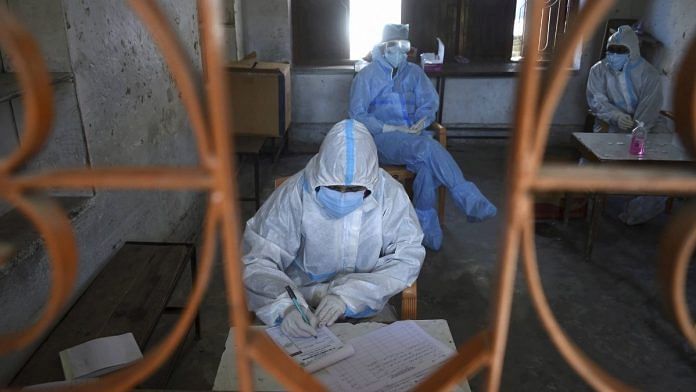New Delhi: The Centre Tuesday asked all states to conduct a 100 per cent audit of all Covid deaths and shared with them a three-page document that lists the details of the person, when was he admitted to the hospital, treatment protocol, complications that developed, and the exact reason for death.
The plan is to perform a disaggregated analysis of all Covid deaths to find out the exact impact of various comorbidities.
“We have asked states to do two things — Covid death certification and 100 per cent death audit. The certification is the usual process carried out under the aegis of the Registrar General of India, but that would help us deal with the criticism of underreporting. But the death audit is a very important thing because it would help us identify the loopholes and address them,” a senior health ministry official told ThePrint.
“Two or three doctors in the same establishment where the death has happened will look at when the patient was admitted, how long it took for the deaths to occur, what was done in the interim and the exact causes of death — asphyxiation, cardiac arrest whatever was the final event. That will give us a disaggregated picture of the role multiple comorbidities are playing in the deaths.”
One important assessment that would be undertaken through this audit is how can the treatment protocol be made better, the official added.
Among the comorbidities for Covid are various non-communicable diseases such as heart disease, renal disease, diabetes and cancer. Analysis of about 90,000 of the 1,09,856 deaths that have occurred in India, so far, shows that 17.9 per cent people who died had comorbidities.
53% deaths in people above 60
The analysis also shows that 53 per cent of the casualties have happened in people above 60 years. Among younger people, the most casualties — 35 per cent — have been in the 45-60 year age group, 10 per cent in the 26-44 year age group, while 1 per cent each of the deaths were reported in children below 17, and people in the 18-25 year age group.
It also shows that 70 per cent of deaths were among males.
This means that less than 10 per cent of the population (7.5 per cent of India’s population was 60 years when the 2011 census was conducted; the projection was that the number would touch 10% by 2021) saw 53% of all Covid-related deaths in the country. Ninety per cent of Indians, who are below 60, account for 47 per cent deaths.
In the 45-60 year age group, 13.9 per cent deaths occurred in people with comorbidities. Among the deaths in senior citizens, 24.6 per cent happened in people with comorbidities. Among the deaths in people below 45 years, 8.8 per cent were those who also had diseases such as diabetes, hypertension, cancer etc.
On a positive note, though, India’s test positivity rate is showing a steady decline. While the cumulative rate stands at 8.07 per cent, the weekly positivity rate is 6.24 per cent. On Tuesday, the daily positivity rate was at 5.16 per cent.
There has also been a steady decline in the number of average daily cases. The total number of average daily cases during 9-15 September was 92,830, it was 83,232 during the 23-29 September week, one week later it was 77,113, while it was 70,114 during 7-13 October week.
Also read: Laxity, low seroprevalence & reliance on antigen tests — how Kerala’s Covid battle came undone
Campaign for Covid-appropriate behaviour
Making an appeal for strict adherence to Covid-19 protocol as the festive season kicks in, Niti Ayog member (health) Dr V.K. Paul urged young people to be particularly careful. “Youth are actually getting it more, they are also spreading it more. So they should not be overconfident,” Dr Paul said at the Covid briefing Tuesday.
With an eye on the winter months, when the virus is expected to flourish because of a higher vulnerability to respiratory diseases, the government has also launched a two-month campaign for Covid-appropriate behaviour. The slogan is “jab tak dawai nahin tab tak dhilai nahin (no letup till there is a medicine)”.
There will be region-specific targeted communication in high caseload districts. Banners and posters would be put up at public places such as markets, milk booths etc, and frontline health workers such as Anganwadi workers and ASHAs will be used as messengers.
The campaign was launched on 8 October by Prime Minister Narendra Modi through a tweet using the hashtag #Unite2FightCorona. A Covid-19 pledge was administered in 500 central government offices.
Various ministries will launch their own outreach programmes to reach out to people; the target is to get the message to 90 crore people in the next two months.
Also read: 2 parameters will decide India’s Covid vaccine priority — risk of exposure & of severe disease



